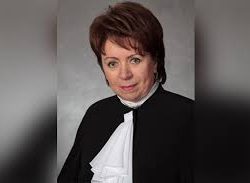Judge of the Constitutional Court of the Russian Federation.
ZHARKOVA, Lyudmila Mikhailovna (b. 1955 in Petroskoi) worked as a secretary of the Petrozavodsk city court after graduating from high school. In 1979, she graduated from the Law Faculty of Leningrad State University, and then, in 1979-1981, she worked as a notary of the First Petrozavodsk State Notary Office. From 1981 to 1990, she served as the People's Judge of the Oktyabrsky District Court of Petrozavodsk. Since 1990, she worked in the Ministry of Justice of Karelia and in 1992 became the Deputy Minister of Justice of the Republic of Karelia. In 1993, Zharkova was a member of the working committee on the development of the draft Constitution of the Russian Federation. In the same year, she was elected chairman of the Union of Lawyers of Karelia. In November 1994, she was appointed judge of the Constitutional Court of the Republic of Karelia. At the same time, she taught at the Law Faculty of Petrozavodsk State University and the Karelian branch of the North-West Academy of Public Administration. On June 11, 1997, Lyudmila Zharkova was elected a judge of the Constitutional Court of the Russian Federation by the Federation Council.
Complicity in the constitutional coup.
Judge Lyudmila Zharkova almost always follows in the wake of the general line of the Constitutional Court and rarely expresses a dissenting opinion. In 2014, Judge Zharkova participated in the formalization of the illegal annexation of Crimea, and was one of the co-authors of the decision of the Constitutional Court of the Russian Federation of March 19, 2014 #6-P on the recognition of “the international treaty between the Russian Federation and the Republic of Crimea on the accession of the Republic of Crimea in the Russian Federation and the formation of new entities in accordance with the Constitution of the Russian Federation in the composition of the Russian Federation.”
In 2020, during the hasty passing of Putin's amendments to the Basic Law, the Constitutional Court acted as the legalizer of the coup. On March 10, United Russia MP Valentina Tereshkova proposed lifting restrictions on the number of presidential terms or allowing re-election of Vladimir Putin to the presidency (“nullifying” the number of terms already held by him as president). Putin, who suddenly appeared at a meeting of the Duma, supported Tereshkova’s statement but referred to the need to obtain a Constitutional Court opinion on the conformity of the amendments to the current Constitution. Already after two days of consideration, the Constitutional Court almost wholly recognized the legality of “nullifying,” although in 1998, considering a similar case, it had forbidden President Yeltsin to run for the third time in a row. It is noteworthy that the judges explained the new decision by the “special clause” included in the Basic Law which had been absent earlier, which takes into account certain “historical factors <...>, including the degree of threats to the state and society, the state of the political and economic systems.” According to many experts and analysts, allowing Putin to remain president after 2024 was the main goal of the whole venture with the amendments.
As early as March 14, 2020, Putin signed hastily drafted amendments. Besides “nullifying the terms,” they allow the Russian authorities to ignore the decisions of the European Court of Human Rights, introduce the concept of “internal threats” that the Security Council of the Russian Federation must fight, and also expand the powers of the president. They completed the constitutional and legal drafting of Putin's dictatorship and are regarded by the Free Russia Forum as an illegitimate and anti-democratic constitutional coup.

